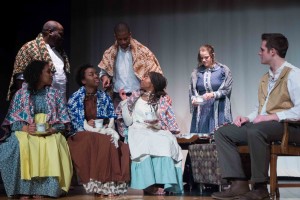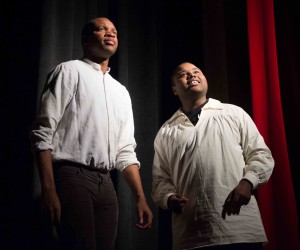
Black History Month will end with an award-winning play on BYU campus about the famous first black pioneer woman, who was also mentioned in a new gospel doctrine statement about race and the priesthood.
“I am Jane” is an award-winning play about Jane Elizabeth Manning James, who journeyed 800 miles barefoot with her family to join the Saints in Nauvoo, Illinois. Jane was one of the first black members of The Church of Jesus Christ of Latter-day Saints. She endured mobs and racial prejudice as she fought for her beliefs.
Bree Ball Rivas, director of the show and a pre-communications freshman at BYU, said Jane was an incredible woman whom audience members will fall in love with because of her incredible example of faith and love.
“Everyone who sees the story can see a bit of their own story because it is a story of not belonging and not fitting in, and we all feel that at some point,” Rivas said.
BYU English professor and playwright Margaret Blair Young wrote the play to help people realize there are many Mormon history stories they don’t know but need to know to better understand how remarkable the history is.
Young hopes Jane’s faith and conviction inspires the audience. Young chose to restrain her creative writing skills by using as much of the characters’ original language from existing documents as she could in order to portray their true testimonies instead of fictionally written ones.

“We have so many things we know that Jane actually said because of documents,” Young said. “It was a great opportunity to make as much of the play’s script be original with the characters and what they really said, but also to show Jane’s true tenacity.”
According to Young, BYU does not participate as heavily in Black History Month as some other universities do. Providing this show on campus is her way of helping the 265 black students at BYU feel that this is a special month for them to celebrate their culture and history.
The cast has experienced many struggles as they come together in preparation for opening night, perhaps more than other productions. Rivas has felt the heat of pulling everything together as a first-time director.
Rivas said, as a director, it was challenging to find cast members of African American decent to play the characters because BYU is a predominately Caucasian student university. Casting got off to a rough start when some members who had been cast dropped out and roles had to be changed.
“We’ve come across many miracles just to find people to fill the roles,” Rivas said.
For example, Josianne PM, who asked that her last name be abbreviated, joined the cast as a character named Rachel and was then informed that she would be playing the main role of Jane.
“It is a daunting, humbling and exciting experience because Jane was an incredible woman,” PM said. “She was a woman of faith, which I am, but she was a woman of patience, which I am not.”
PM fired up with a burst of passion when she talked about the example Jane set for her.
“There are things I need to learn from her about how to make this ‘being a Mormon thing’ and being black work because they clash all the time,” PM said.
PM is currently dealing with a challenging pregnancy that leaves her ill, exhausted and unable to stand for more than an hour at a time. She said it is important to her to play this role even in her current condition because this play has had such a huge impact on her life.
When PM was 16, she saw a flyer with a black woman in a pioneer bonnet advertising the play and she attended a rendition of “I am Jane.” The play came into her life at a key time, as PM was encountering overt racism that summer in California as she cared for children as a nanny far away from her home state of New York.
“I saw it the first night and was blown away by it,” PM said. “So much so that I came back the second night and helped out back stage.”
PM attributes the line, “God gifted us our race” that Elijah Able says in the play to a drastic change in her life.
“It changed the rest of my life because it was then when I realized I am what I am and I’m going to own it, be proud of it, not shy away from it, and people will just have to deal,” PM said.
Jane Elizabeth Manning James’s name has appeared in a much more recent document than history or production pieces. The Church released a new statement in December 2013 regarding race and the priesthood. Jane is mentioned in the document as “a faithful black member who crossed the plains and lived in Salt Lake City until her death” but was never allowed to receive her temple endowment; however, she was allowed to participate in baptisms for the dead after she appealed the denial of her temple endowment to every Church leader she knew.
“This is the one year the play really matters because of the new statement,” Young said. “It would matter so much to Jane to see the words of the statement not only denouncing racism but denouncing the teachings that blacks couldn’t participate in temple ordinances in her time.”
The play will run Feb. 25–March 1 in the Education in Zion Theater, B-192 JFSB. Productions will be at 7:30 p.m. with a Saturday matinee at 2:00 p.m. Tickets are available at the Wilkinson Student Center Information Desk. Tickets cost $3.00 per person or $5.00 per couple.




